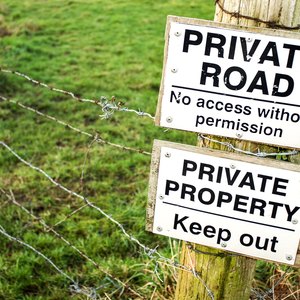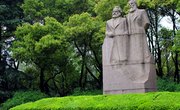
The ability for private individuals to own property is one of the key differences between capitalism and communism. These two economic systems take opposite approaches to private property ownership. In capitalism, private ownership is seen as a right, while in communism property rights are reserved for the state. Ever since "The Communist Manifesto" summarized the system’s philosophy in 1848, communism has been associated with the idea that the means of production should be in the hands of government instead of private companies.
Property Rights Definition
Many think of a parcel of land when hearing the word “property,” but the actual meaning of the word is much broader. In legal terms, property is defined as anything that can be owned. Land and buildings are frequently referred to as real property, while the term personal property is often used to describe other types of possessions.
Property is also described as being tangible or intangible. Tangible property has a physical existence. Intangible property is something that has value without a physical presence, or there may be a representative object, like a piece of paper. Stocks, bonds and intellectual property are examples of intangible property.
Property rights are defined as the authority of an individual or group of individuals to decide how property will be used. Throughout history, different societies have used laws and social customs to enforce rules about property rights. These rules are often the defining characteristic of the society and the basis for its economic system.
Public Vs Private Property
Property that is owned by a government is known as public property. In the United States, public property is typically managed by a government agency. For example, the National Parks Service is a federal agency that oversees the national parks, monuments and other historic properties. Congress is responsible for establishing laws that govern public property.
Private property is defined as anything that’s not owned and managed by a state entity. The owner of private property usually has control over its management, use and sale. In countries where the accumulation of private property is allowed, the government enforces private property rights and provides protection against illegal seizures. In countries where private property is not allowed, the government ensures that property is shared and wealth is redistributed so that no one person is allowed to hold on to more property than is needed for daily survival.
Private Property Rights
There are several rights that are associated with the ownership of private property. An owner can determine how property is used and also has exclusive rights to any profits that result from services related to the property. For example, the owner of a house can decide whether to live in it or rent it out and is entitled to any rental profits. Another important right that private property owners enjoy is the ability to sell, trade or give away the property and keep the proceeds of the sale.
Property rights are fundamentally important to any society because they control violent competition over resources. If there were no rules to protect the rights of private property owners, anyone could steal property or confiscate it by force. Laws that enforce property rights help ensure a more peaceful society. People still compete for property in societies with strong private property rights, but law enforcement and social pressure makes them more inclined to use legal market exchanges to gain ownership.
Marx’s Definition of Private Property
"The Communist Manifesto" was published in 1848 by two German philosophers, Karl Marx and Friedrich Engels. They were the first to set down a formal description of an idea that many thought would solve social and economic inequality. Marx and Engels viewed history through the lens of class struggle, with an economically subordinate class being controlled by a dominant class. Slaves and masters, serfs and landlords, proletariats and bourgeoisie are given as examples of the oppressed and the oppressor throughout history. Marx expanded his ideas about communism in "Capital," also known as "Das Kapital," a three-volume work written between 1867 and 1883.
Marx and Engels saw the society of their time as being controlled by a bourgeoisie ruling class that controlled production, commerce and trade as well as large amounts of real estate. Modern industry was converting workers into slaves without property of their own, with the working class being treated as just another commodity to be used and discarded by the ruling class. To overcome this inequality, Marx and Engels proposed that every individual worker has the right to enjoy the benefits of their labor and that no man can own another person’s body or labor.
Private Property in Capitalism
Capitalism is defined as an economic system where industry, banking and trade are controlled by private citizens rather than the country’s government. In a capitalist system, the emphasis is on private ownership of factories, farms and other types of businesses and on the profits that these enterprises create. A country with a capitalist system is said to have a free market since the supply and price of consumer goods are set by competing companies and corporations. Government intervention in the market is limited.
The economic theory of capitalism is attributed to Adam Smith, a Scottish economist and philosopher. His most famous work, "The Wealth of Nations," was published in 1776 and is still considered to be a classic study of how national economies build wealth. Smith described how free markets encourage competition and spur growth.
Although Marx and Engels were not opposed to people having consumable property like food and clothing, they objected to the accumulation of vast wealth by private individuals. In contrast, this accumulation is valued in a capitalist system based on the pursuit of self-interest and the freedom to buy, sell and produce goods and invest or spend the profits.
Private Property in Communism
Public ownership of property, especially the “means of production,” is one of the most important tenets of communism. Karl Marx blamed private property rights for the outrageous gap between rich and poor that the Industrial Revolution was creating in Europe at that time. Instead of encouraging competition for property, he wanted government to make sure that property was shared. According to Marx, a communist government should control property on behalf of its citizens and enforce economic equality.
In an ideal communist system, the workers own all public property and the government represents the workers’ interests. Everyone works for the common good and receives only the property they need, effectively eliminating the gap between rich and poor. One of the biggest criticisms of communism is that weakening private property lessens the incentive of both workers and those who are charged with managing the means of production. Removing the personal incentive of private property ownership reduces their stakes in the success of their enterprise. Critics also say that common ownership of property takes away much of the incentive to maintain and improve the property.
Value of Property in Capitalism and Communism
The property rights of capitalism dictate that the value of property is determined by market demand. In theory, property owners are free to charge as much for the sale of property as a buyer is willing to pay. In practice, government regulations may place a limit on a property’s value for the greater good of society. The rent controls seen in many U.S. cities are an example of a regulated property value.
In "Capital" Marx described a radically different theory of property value. He argues that a commodity’s value should be determined by the amount of human labor required to produce it. The materials used for production don’t factor into value. If it takes longer to make a pair of shoes than a pair of pants, for example, then shoes should cost more regardless of the cost of the materials used to make them.
Although Marx wasn’t the first economist to propose this labor theory of value, he was the first to argue that it was a workable alternative to capitalism. Today, most economists reject Marx’s ideas about labor value. Marx argued that capitalists create wealth for themselves by exploiting workers. However, many successful capitalists use investments, financial risk and the creation of economic opportunities to get ahead. In many cases, a successful capitalist helps workers by creating jobs and spending money on products and services.
The Role of Socialism
In addition to analyzing capitalism, Marx and Engels used "The Communist Manifesto" to propose an alternative economic system based on socialism. Under this system, some common property is owned by the state with the goal of achieving both social and economic equality, but some rights of private property are maintained. Public officials maintain control over trade, the flow of capital and other important resources with the goal of equal distribution among all citizens.
Communism is based on the idea of the proletariat working class rising up and seizing private property from the bourgeoisie owners. Unlike communism, socialism does not require revolution and the complete abolition of private property. Socialism can exist in different types of political systems, including democracies. Modern countries that define themselves as socialist in their constitutions include India, Sri Lanka and North Korea. Countries like Sweden and Norway that provide a wide network of social services for their citizens still define themselves as being democratic and having a free market.
Karl Marx believed that socialism would cure problems like poverty, inequality and the concentration of large amounts of money in the hands of a few, but he provided few details in his writings on how a socialist system would work. Part of the philosophy of communism is the idea that a country would abandon capitalism in favor of socialism and work toward a more idealized form of communism. History has yet to show that this idea would work.
Capitalism and Communism in Practice
There are no countries that successfully practice either pure capitalism or pure communism. During economic emergencies, such as the recent recession, the U.S. government has stepped in with new regulations and company bailouts. We have minimum wage laws to protect the lowest-paid workers and many argue that our Social Security system is a form of socialism. Some economists also view price controls, where the U.S. government determines the maximum selling price for private property, as a noncapitalist restriction on private property rights.
China, which has a communist form of government, also makes some concessions to socialism and even capitalism. Many economists describe China’s current system as state capitalism, where the government owns many firms and determines which will receive loans and subsidies. At the same time, private companies have been allowed to grow and flourish in the country since economic reforms that began in the late 1970s. The restrictions on private property have also been loosened and some business people and celebrities are allowed to accumulate private wealth.
References
- University of Idaho: Defining Capitalism, Communism, Fascism, Socialism
- Marxists.org: Manifesto of the Communist Party
- The Library of Economics and Liberty: Marxism
- The Library of Economics and Liberty: Property Rights
- Marxist.org. "Capital A Critique of Political Economy Volume I Book One: The Process of Production of Capital," Page 1-549. Accessed August 19, 2020.
- Marxist.org. "Capital A Critique of Political Economy Volume I Book One: The Process of Production of Capital," Page 330. Accessed August 19, 2020.
Writer Bio
Catie Watson spent three decades in the corporate world before becoming a freelance writer. She has an English degree from UC Berkeley and specializes in topics related to personal finance, careers and business.
